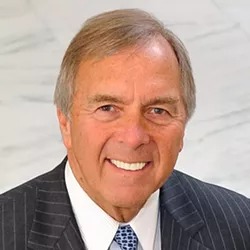With Gov. Scott Walker's announcement this week, fifteen Republican presidential candidates have declared. Expect more entrants to emerge. Having assessed the bleak chances of four repeat performers last week, let's examine four other Republican entrants: Ben Carson, George Pataki, Bobby Jindal and Rand Paul. Three of them are accomplished politicians and all have achieved success, but none, in my analysis, will secure the nomination. Here's why: They'll be unable to raise the massive money necessary to compete for the nomination, or they'll be co-opted on their favorite issues by other well-funded or more popular candidates.
BEN CARSON is a world-famous surgeon. Soft-spoken, yet firmly committed to conservative values, Carson lacks any kind of track record in government. Never having been elected to public office is a detriment for his candidacy. While possessed of thoughtful and cogent policy ideas, he lacks a defined purpose for his nomination. An expert in health care, Carson's anti-Obamacare views are echoed by other candidates, so his expertise can't define him in a winnable way.
GEORGE PATAKI was elected governor of New York in 1994 as a long-shot candidate, defeating a powerful Mario Cuomo. He served three terms and saw New York through the tragedy of 9/11. Because he won as an unknown in 1994, he's convinced that being a long-shot in 2016 will bring him similar success. He's wrong. Pataki won't be able to raise funds necessary to compete long-term, so he'll likely say "so long" early in the process. Pataki is a fine person with an impressive list of Republican accomplishments in a deep blue state, but a lot has changed in politics since he served in public office. Those changes will not benefit Pataki.
BOBBY JINDAL lost the race for Louisiana governor in 2003, was elected to the U.S. House of Representatives in 2004 and was reelected in 2006. In 2007 Jindal was elected Louisiana governor; he was reelected in 2011. At 44, he's the youngest of all the candidates. If elected president, he would be the first person of Indian heritage to serve. Jindal has achieved remarkable political success in America. He delivered, to tepid response, the Republican reply to President Obama's State of the Union address in 2009. Though highly educated, very bright and experienced for his age, his strict, anti-government message likely will not wear well in today's political environment, especially since Jindal faces several nagging challenges in Louisiana, making his candidacy a long shot.
RAND PAUL was elected to the U.S. Senate from Kentucky in 2010. Basically a libertarian, his views have been popular in some anti-government circles, but he's been criticized by other Republicans for his perceived reluctance to support an aggressive military presence around the world. An ophthalmologist by background and training, Paul rose to political prominence opposing big government, decrying the American tax system and bearing the last name of perhaps the most prominent libertarian politician in America — his father, former Texas congressman Ron Paul, who himself sought the presidency in 2008 and 2012.
Though intelligent and well-spoken, Paul is tainted by the libertarian moniker, perceived as too tolerant of behaviors thought by some to be aberrant, as he often adopts a "no-government" approach to policy matters. While that may attract some voters, it's doubtful that Paul can capture a broad-based constituency for his presidential aspirations. While Paul touts raising just over a million dollars in the second quarter of 2015, he has miles to go in the 2016 presidential sweepstakes and likely won't last. He'll probably be reelected to the Senate after he fails to secure the Republican nomination.
Anyone who becomes a candidate for president deserves congratulations for his or her courage and energy. The campaign may actually be tougher than the presidency: having every word parsed by opponents and press outlets, needing to be cheerful to and tolerant of citizens who aren't always respectful nor articulate, and having one's history, finances, every prior utterance and action scrutinized to death. We owe all candidates, whatever our preferred party affiliation or political bent, gratitude for presenting themselves as candidates for the most important public policy position in the world. Yes, there are benefits to the presidency, and we need our best people running, but we all need to understand what it takes to run, win and then govern effectively.
Now eight candidates have been eliminated, by my calculations, leaving three U.S. Senators and a former business executive, among others, with Ohio Gov. John Kasich expected to announce soon. Stay tuned for more predictions in my August column. ♦

















